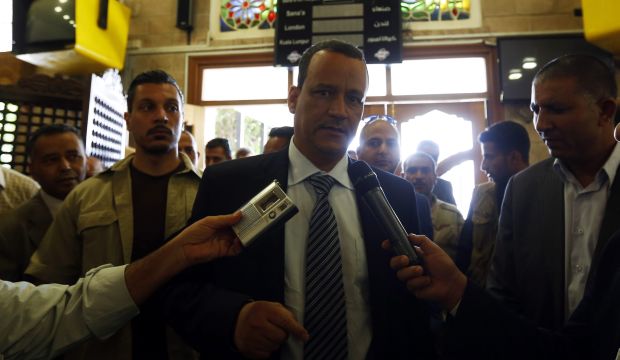
In this May 12, 2015 file photo, UN Envoy to Yemen Ismail Ould Cheikh Ahmed speaks to reporters upon his arrival at Sana'a International Airport, Yemen. (EPA/Yahya Arhab)
Cairo, Asharq Al-Awsat—The United Nations has proposed sending UN observers to Yemen in cooperation with the Arab League in order to oversee a resolution to the crisis that has gripped the country since last September.
The proposal is among a number of ideas put forward by UN Secretary General Ban Ki-moon to the head of the Arab League, Nabil Elaraby, to find a political solution to the crisis in Yemen. The proposals were relayed by UN Special Envoy to Yemen Ismail Ould Cheikh Ahmed who met with Elaraby at the League’s headquarters in Cairo on Thursday.
During a press conference held after the meeting, Ould Cheikh Ahmed said there was “convergence” between the UN and the Arab League that “a political solution is the only solution to the crisis in Yemen,” according to the Kuwait News Agency (KUNA).
He stressed the importance of both organizations cooperating in order to ensure the crisis came to an end swiftly and said the UN had proposed sending observers to work with the Arab League in Yemen to bring about an end to the fighting in the country.
Yemen’s crisis began in September 2014 when militias from the Shi’ite Houthi movement, backed by Iran and Yemen’s ousted former president Ali Abdullah Saleh, overran the capital Sana’a.
The rebels took over government, military, and media buildings and installations and began spreading to other parts of the country. In February this year they launched a coup deposing internationally recognized President Abd Rabbuh Mansur Hadi and the government.
They set up a committee, largely composed of Houthi members and officials allied to them, to oversee the running of the country’s affairs and also put Hadi and members of the cabinet under house arrest.
Hadi eventually escaped captivity and headed to Riyadh, where he requested Saudi Arabia and its Arab allies intervene with military force in Yemen in order to restore political legitimacy in the country.
The Saudi-led air campaign targeting the Houthis began on March 26 and involves a number of Arab countries including Egypt, the UAE, Bahrain, and Qatar.
The Arab coalition declared a five-day truce last week to allow humanitarian supplies to reach Yemenis caught up in the conflict—which alongside the airstrikes has also involved fighting on the ground between the Houthis and Hadi loyalists.
The airstrikes restarted, however, after the Houthis broke the terms of the truce and continued engaging in military action, including targeting civilian areas.
On Wednesday international NGO Human Rights Watch (HRW) said it had evidence the Houthis had targeted civilians in the southern port city of Aden throughout the month of July.
In one attack on a residential area, shelling by Houthi militias killed around 100 people, mostly civilians and including children.
“Pro-Houthi forces have been raining mortar shells and rockets onto populated areas of Aden with no apparent regard for the civilians remaining there,” Ole Solvang, HRW’s senior emergencies researcher, said in a press release. “These unlawful attacks take a terrible human toll and should stop immediately.”
“Houthi leaders should realize that they could face a war crimes trial for ordering or even just overseeing indiscriminate rocket attacks on civilian neighborhoods,” Solvang added.
